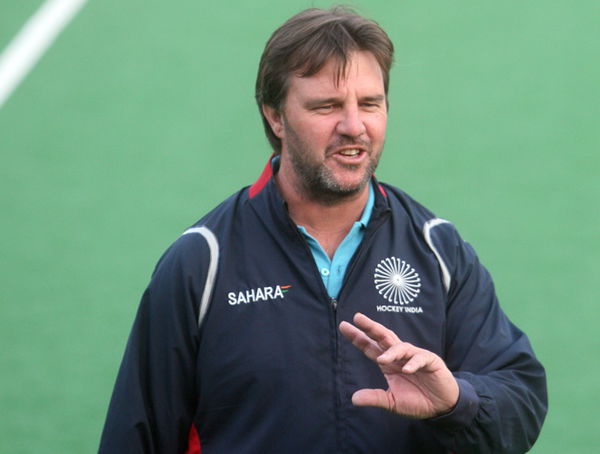
via Imago
David John, India hockey interim coach

via Imago
David John, India hockey interim coach
There has been so much talk on the issue of Indian hockey’s new coaching assignments. But recently as per reports, all the brouhaha regarding the same met its extremity. Last month, Hockey India (HI) appointed Sjoerd Marijne as chief coach of the men’s team and David John as interim coach. Not only that but they have also put Harendra Singh in charge of the women’s team.

via Imago
David John
As we all could tell, the men needed a coach to replace the outgoing Roelant Oltmans, hence Marijne stepped up to the plate. He was in charge of of the women’s team, but recently embraced the opportunity to make a switch to men’s team. On the other end, Singh was brought back to the national level. Since he guided India to victory at the junior hockey World Cup last year he is best suited for the job.
ADVERTISEMENT
Article continues below this ad
Being outplayed in musical chairs that just played out in Indian hockey, Singh’s place with the junior men’s team occupied. And it has been taken by none other than the former India captain Jude Felix.
Marijne and Singh’s terms are said to be till 2020 Olympics in Tokyo. And the man at the center of this hiring process was HI’s high-performance director, David John. Ahead of the Asia Cup in Dhaka from 11-22 October, John spoke about the immediate future of Indian hockey.
Targets for Marijne and Singh:
The target for the men’s team is to win every tournament and be ranked No.1 by 2020. Harendra’s first assignment is the women’s Asia Cup (28 October-5 November) in Japan, and we would expect them to finish in the top 3. Then they don’t have any other tournament until the Commonwealth Games (April 2018) in Australia.
Premature ending of tenure and job insecurity:
I think it’s different. Michael Nobbs retired with illness, Terry Walsh’s contract ran out, Paul van Ass left after a short period but Oltmans was in India for close to five years. Now we come to a new coach again. We understand what’s required. Coaching India is different from coaching in Europe. I’m confident Marijne is well aware of the Indian system.
Marijne’s mindset on becoming men’s coach:
The women’s team was improving. He was reluctant to leave them because of that. But he saw the men play in Europe and was impressed with the juniors coming into the senior set-up.
The women hockey’s triumphant stint in Hockey World League:
We made big changes after that tournament in Johannesburg. Six senior players were left out. There was a significant change in the intensity of training. It’s no longer good enough to be a senior player. We selected six young players for the Europe tour (that followed), and the team played well. That’s what we want from Indian hockey. We need to do better than rank 12. We need to be in the top 10.
Senior players in Men’s Asia Cup 2017 questionable:
I don’t know why. (S.V.) Sunil was Asian (Hockey Federation) Player of the Year in 2016. Both (Sunil and Sardar Singh) were good in the previous tournament. We want a blend of experience and youth. Sardar will be going back to his normal position of “free man” (one who can move up and down to assist the midfield and defense) in the defense. His main job is to make intercepts.
ADVERTISEMENT
Article continues below this ad
The shaped up junior men’s team:
The junior boys are in Lucknow now, where they have been split into two teams in a domestic tournament. The best from these two groups will be selected for the Sultan of Johor Cup in Malaysia from 22-29 October. We are just starting the transition to the next junior World Cup. They may not perform as well as the juniors last year, but we will keep this core group together so that they improve. Many other countries are taking much older players for the Johor Cup, so it will be a good test for our youngsters.
ADVERTISEMENT
Article continues below this ad
Developing talent:
The National Hockey Academy (NHA) has started at Delhi’s Major Dhyan Chand National Stadium. Players between the age of 16-17 have been invited for trials. Each year there will be selection trials. This year, we will take 25 boys and 25 girls. Next year, we will increase the number. They will have their academics, accommodation, food, training all taken care of by the NHA.
We have also appointed a foreign coach and a foreign scientific coach, besides six Indian coaches—four males and four females. The Indian coaches will also do an internship under the foreign coaches. That will also help us develop our coaches.
ADVERTISEMENT
ADVERTISEMENT
ADVERTISEMENT
ADVERTISEMENT

